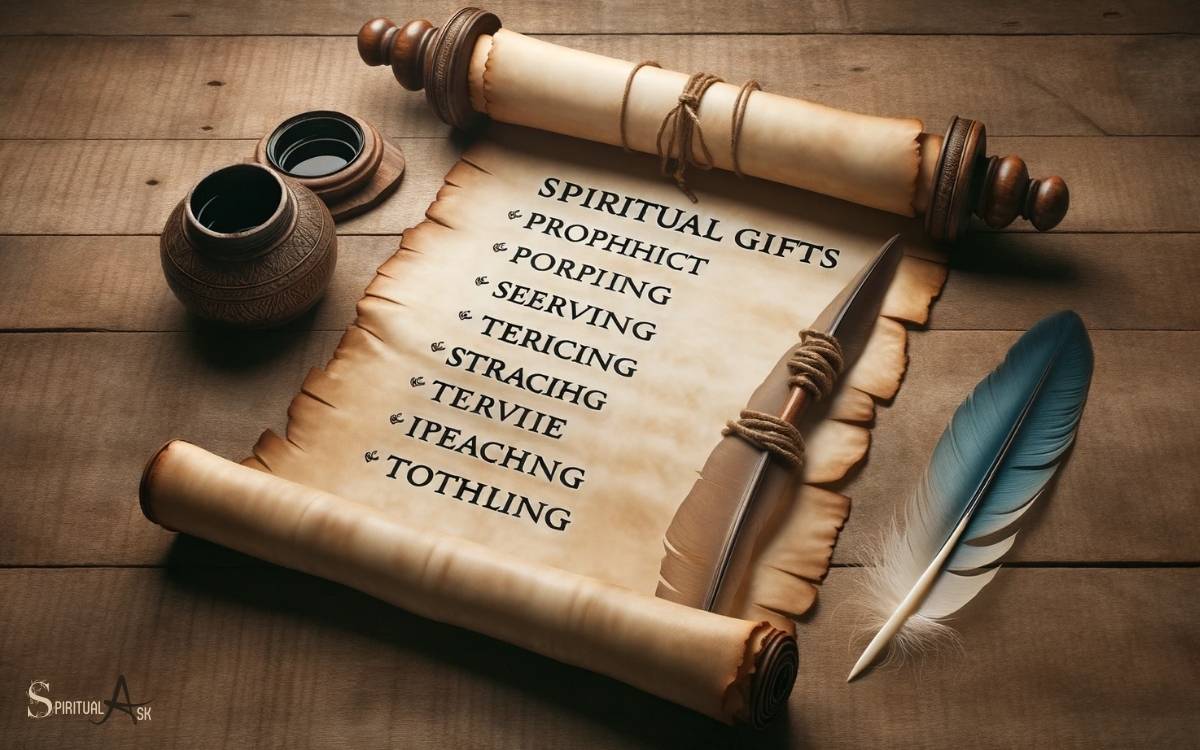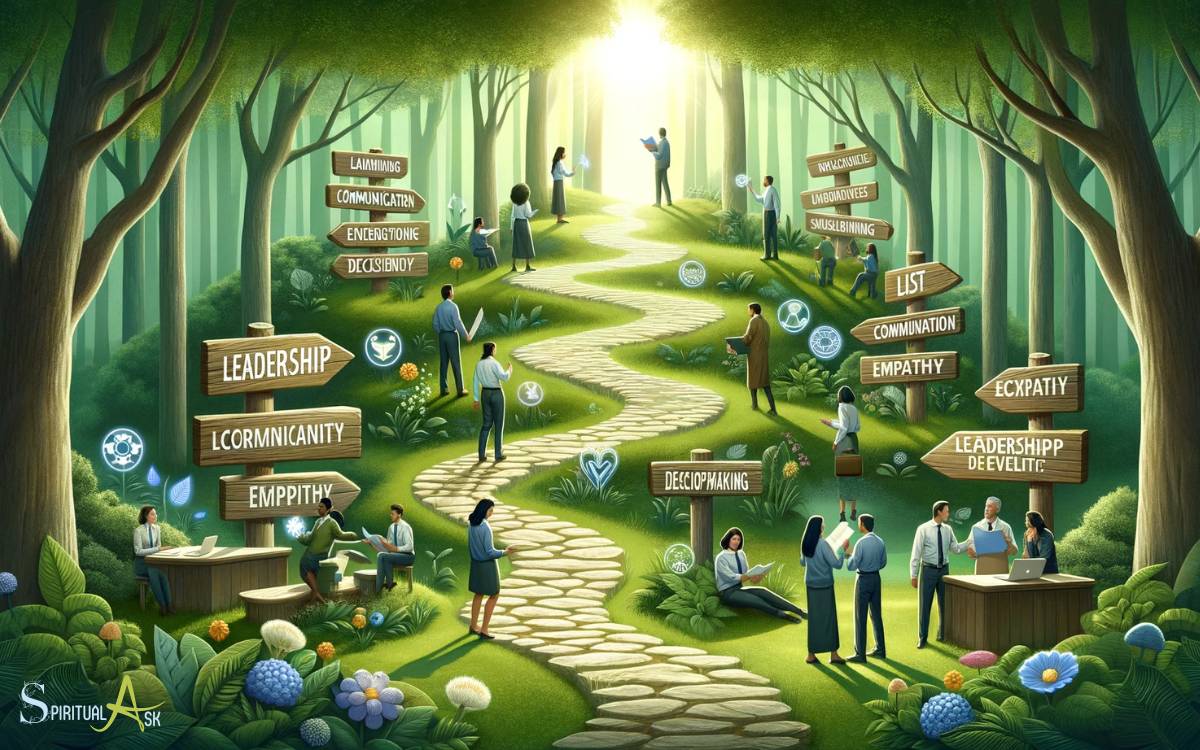Romans 12 Spiritual Gifts List: Prophesying, Serving!
Romans 12 spiritual gifts list includes prophesying, serving, teaching, exhortation, giving, leading, and showing mercy.
Romans 12 is a chapter in the Bible that discusses the importance of spiritual gifts given by God to Christians. These gifts, described by the Apostle Paul, are meant to be used for the benefit of the church and to glorify God.
Romans 12 emphasizes the significance of utilizing one’s spiritual gifts to strengthen the body of Christ.
These gifts are unique to each individual, making it essential for believers to discover and employ their God-given abilities for the edification of the church and the glory of God.

Key Takeaway
12 Spiritual Gifts List Of Romans
| Spiritual Gift | Description |
|---|---|
| Prophecy | The ability to speak forth God’s truth and declare what God is revealing for the benefit of others. |
| Serving | The ability to meet practical needs by providing assistance and support to others in the body of Christ. |
| Teaching | The ability to communicate God’s Word in a clear and understandable way, helping others grow in their faith and knowledge. |
| Encouragement | The ability to motivate, inspire, and uplift others in their faith and walk with God. |
| Giving | The ability to generously and sacrificially give of one’s resources to help others and advance the Kingdom of God. |
| Leadership | The ability to guide, direct, and influence others towards a common goal or vision. |
| Mercy | The ability to empathize with and compassionately reach out to those who are suffering or in need. |
Prophecy

I believe that the spiritual gift of prophecy involves speaking forth messages from God to the community. This gift isn’t about predicting the future, but rather about sharing God’s heart, wisdom, and truth with others.
It’s like being a channel for God’s voice to reach people. When someone operates in the gift of prophecy, they bring encouragement, edification, and comfort to those around them.
It’s not about drawing attention to oneself, but about pointing others towards God and His purposes.
The message shared through prophecy should always align with the teachings of the Bible and bring glory to God.
This gift is meant to build up the church and help believers grow in their faith. It’s a powerful tool for strengthening and guiding the community of faith.
Serving
I love to serve others because it’s a way to show love and kindness. Serving joyfully brings a sense of fulfillment as I use my gifts to help those around me.

It’s important to remember that serving is not just about what we do, but also about the attitude with which we do it.
Importance of Serving
The importance of serving is evident in the fulfillment it brings to one’s life and the impact it has on others.
When we serve others, we not only meet their needs but also experience a sense of purpose and satisfaction. It allows us to contribute to something greater than ourselves, fostering a deep sense of fulfillment.
Moreover, serving others creates a positive ripple effect, inspiring and uplifting those around us. Our actions can have a lasting impact on the lives of others, spreading joy and hope.
Through serving, we build meaningful connections and relationships, strengthening the fabric of our communities.
The act of serving is not only beneficial to those we serve but also enriches our own lives in ways we may not initially realize.
Serving Others Joyfully
As an individual, my experience has shown that serving others joyfully amplifies the positive effects of my actions. When I serve others joyfully, it not only benefits them but also brings immense satisfaction and fulfillment to my own life.

Here are three reasons why serving others joyfully is impactful:
- Enhanced Connection: Joyful service creates a deeper connection with those being served, fostering a sense of community and understanding.
- Positive Impact: Serving others with joy has a more profound impact on their lives, as the positivity and sincerity behind the action are palpable.
- Personal Fulfillment: Joyful service brings a sense of purpose and contentment, enriching my own life in ways that extend beyond the act of service itself.
Transitioning into the subsequent section about ‘using gifts to serve’, it is important to understand how our unique gifts can be used to serve others effectively.
Using Gifts to Serve
Transitioning from serving others joyfully, it is essential to recognize how our unique gifts can be utilized to effectively serve others. Each of us has been given specific gifts and talents that can be used to benefit those around us.
Whether it’s through teaching, hospitality, leadership, or mercy, we are called to employ these gifts in service to others. Understanding our gifts and using them to serve not only brings fulfillment to us but also meets the needs of those we serve.
It’s important to remember that our gifts are not for our own glory but for the building up of the community and the advancement of God’s kingdom. By using our gifts in service, we contribute to the overall well-being and growth of the body of Christ.
Teaching
When it comes to spiritual gifts, teaching is a vital and impactful ability. Effective instruction techniques, such as storytelling and practical application, are essential in conveying knowledge

and understanding. The impact and influence of a good teacher can be profound, shaping minds and hearts in significant ways.
Teaching as a Gift
I believe that teaching is a valuable spiritual gift that allows me to share knowledge and wisdom with others. Through this gift, I can inspire, motivate, and guide individuals towards personal growth and understanding.
Teaching as a spiritual gift enables me to foster a supportive and nurturing environment where individuals can flourish and develop their own skills and talents.
It is a privilege to be able to impart valuable lessons and insights that have the potential to positively impact the lives of those I teach.
This gift empowers me to contribute to the growth and development of others, and I am grateful for the opportunity to serve in this capacity.
Effective Instruction Techniques
Having honed effective instruction techniques, I aim to enhance the impact of my teaching gift by employing methods that engage and empower learners to reach their full potential.

One technique I utilize is interactive learning, where I encourage active participation through discussions, group activities, and real-life applications of the subject matter.
By creating a dynamic learning environment, I ensure that students are not passive recipients but active participants in their own learning journey.
Another important technique is to cater to diverse learning styles by incorporating visual aids, hands-on demonstrations, and auditory elements into my lessons.
This ensures that every student has an opportunity to grasp the material in a way that resonates with them. Ultimately, my goal is to foster a love for learning and equip students with the tools they need to succeed.
Impact and Influence

To maximize my impact and influence as a teacher, I employ interactive learning techniques and cater to diverse learning styles. By doing so, I ensure that every student has the opportunity to engage with the material in a way that resonates with them.
Here’s how I achieve this:
- Utilizing Technology: I integrate various digital tools and platforms to create a dynamic and interactive learning environment.
- Encouraging Active Participation: I foster a classroom atmosphere where students feel comfortable sharing their thoughts and actively participating in discussions.
- Adapting Content Delivery: I adapt my teaching methods to accommodate different learning styles, such as visual, auditory, and kinesthetic, ensuring that all students can grasp the material effectively.
Encouragement

Encouragement is a vital spiritual gift that uplifts and motivates others within the community of faith. It involves speaking words of hope, comfort, and support to those who are facing challenges or feeling disheartened.
This gift enables me to come alongside others, offering them strength and reassurance in their faith journey. By using this gift, I can help build up the body of believers, inspiring them to persevere and remain steadfast in their walk with God.
It’s a powerful tool for fostering unity and resilience within the community, creating an environment where everyone feels valued and supported.
As I encourage others, I also find my own faith strengthened, realizing the impact of uplifting others. Moving on to the next aspect, the gift of giving is equally important in demonstrating love and generosity within the faith community.
Giving

Regularly, I find myself drawn to the spiritual gift of giving, which allows me to generously and cheerfully contribute to the needs of others in the faith community.
This gift empowers me to selflessly offer my resources, time, and energy to support those around me. Through giving, I experience immense joy and fulfillment as I witness the positive impact it has on the lives of others.
My approach to giving is characterized by:
- Cheerful Generosity: I wholeheartedly give without expecting anything in return, deriving happiness from the act of giving itself.
- Sensitivity to Needs: I strive to discern the genuine needs within the community and respond with compassion and practical assistance.
- Consistent Support: I aim to maintain a consistent and dependable presence in meeting the ongoing needs of others, fostering a culture of care and support within the faith community.
Leadership

As a leader, it’s important to understand the qualities of effective leadership and how to develop those skills. Effective leaders often exhibit qualities like empathy, communication, and the ability to inspire others.
Developing leadership skills involves continuous learning, self-awareness, and a willingness to adapt to different situations.
Qualities of Effective Leaders
One key quality of effective leaders is the ability to inspire and motivate their team towards a common goal. This involves fostering a sense of purpose and direction, and encouraging each team member to contribute their best efforts.
Effective leaders also demonstrate strong communication skills, actively listening to their team and providing clear guidance and feedback.
Furthermore, they exhibit adaptability, being open to new ideas and willing to adjust their approach based on feedback and changing circumstances.
Qualities of Effective Leaders:
- Inspiring and Motivating: Fostering a sense of purpose and direction.
- Strong Communication Skills: Actively listening and providing clear guidance.
- Adaptability: Openness to new ideas and willingness to adjust approach.
Developing Leadership Skills

Continuing from our discussion of the qualities of effective leaders, it is essential to focus on developing leadership skills to further enhance one’s ability to inspire and motivate their team. Developing leadership skills involves honing communication, decision-making, and empathy.
Effective communication ensures that the team is aligned with the vision and goals, while strong decision-making abilities help in navigating challenges and opportunities.
Additionally, cultivating empathy fosters a supportive and understanding environment, leading to better collaboration and trust. It’s also crucial to continuously seek feedback and self-improvement, learning from both successes and failures.
Furthermore, seeking mentorship and learning from experienced leaders can provide valuable insights and guidance. By actively working on these skills, one can strengthen their leadership capabilities and positively impact their team and organization.
Mercy

In my experience, mercy is a spiritual gift that allows me to show compassion and forgiveness to others in a way that reflects the love and grace of God. This gift enables me to empathize with those who are suffering or have made mistakes, and to offer them kindness and understanding.
Through the spiritual gift of mercy, I am able to:
- Extend compassion: I am able to deeply understand and empathize with the pain and struggles of others, leading me to offer genuine compassion and support.
- Forgive readily: I find it natural to forgive others, recognizing that we all make mistakes and that forgiveness is essential for healing and growth.
- Show kindness: Mercy allows me to demonstrate kindness and patience towards others, fostering an environment of love and understanding.
Discernment

Exercising the spiritual gift of discernment, I am able to perceive the motives and intentions of others with clarity and wisdom.
This gift enables me to see beyond surface appearances and understand the deeper spiritual realities at play in various situations. It allows me to recognize when something is not aligned with God’s truth, guiding me to make decisions that honor Him.
Discernment also helps me to offer sound advice and guidance to others, steering them away from harm and towards paths of righteousness. I approach this gift with humility and prayer, seeking to use it for the edification and protection of the body of Christ.
As I navigate through life, discernment serves as a compass, helping me stay aligned with God’s will and purpose.
Wisdom

With discernment as my guide, I have found that wisdom often complements and enhances my ability to understand and navigate the complexities of life with God’s perspective.
- Insightful Discernment: Wisdom allows me to perceive situations in a deeper and more profound manner, enabling me to make sound decisions based on understanding rather than impulse.
- Practical Application: It equips me to apply knowledge and discernment effectively in real-life situations, leading to better outcomes and growth.
- Godly Perspective: Wisdom enables me to see things from a divine viewpoint, aligning my thoughts and actions with God’s will and purpose.
Knowledge
Continuing from the previous subtopic, I’ve found that knowledge complements wisdom by providing a foundation of understanding and insight into spiritual truths. Knowledge allows us to grasp the deeper meanings of life and faith, enabling us to apply wisdom more effectively.

In the context of spiritual gifts, knowledge empowers individuals to comprehend the mysteries of God and His divine purpose.
Here’s a table to illustrate the interconnectedness of these concepts:
| Wisdom | Knowledge | Understanding |
|---|---|---|
| Discernment | Insight | Clarity |
| Prudence | Awareness | Revelation |
| Enlightenment | Information | Comprehension |
This table demonstrates how wisdom, knowledge, and understanding are interconnected, each building upon the other to deepen our spiritual insight and discernment.
Faith

Embracing faith has been a transformative journey in my spiritual growth, shaping my perspective and guiding my actions with unwavering trust in God’s promises. Through faith, I have experienced profound personal growth and a deeper connection with God.
Here are three ways faith has impacted my life:
- Providing Strength: Faith has been a source of strength during challenging times, allowing me to find hope and perseverance in the face of adversity.
- Guidance: Faith has provided me with a sense of direction, helping me make decisions with confidence and clarity, knowing that God is leading the way.
- Peace: Faith has brought a profound sense of peace, enabling me to release worries and anxieties, knowing that God is in control of all things.
My journey with faith has been a constant reminder of God’s faithfulness and love.
Are the Spiritual Gifts Listed in Romans 12 the Only Ones Mentioned in the Bible?
No, the spiritual gifts listed in Romans 12 are not the only ones mentioned in the Bible. In fact, how many spiritual gifts are outlined in the scriptures extends beyond this single passage.
Spiritual gifts are dispersed across various New Testament books, highlighting a broader spectrum of divine empowerments bestowed upon believers for the edification of the church.
In addition to Romans 12, key passages include:
- 1 Corinthians 12: Adds to the list with gifts like healing, miracles, tongues, interpretation of tongues, wisdom, knowledge, faith, and discernment of spirits.
- Ephesians 4: Mentions apostleship, prophecy, evangelism, pastoring, and teaching as gifts for equipping the saints for the work of ministry.
- 1 Peter 4: Focuses on speaking and serving as the broad categories of spiritual gifts.
The New Testament reveals a rich diversity of how many spiritual gifts there are, emphasizing that the Holy Spirit distributes these gifts according to His will for the common good of the church. The Bible provides several lists of these gifts, highlighting their variety and importance for building up the body of Christ. Among these, the concept of the 7 spiritual gifts in KJV is often referenced, stemming from Isaiah 11:2-3, which describes attributes like wisdom, understanding, and counsel. These gifts serve as a foundation for believers to grow in faith and effectively serve others in alignment with God’s purpose.
This variety ensures that the body of Christ is fully equipped to fulfill its mission, showcasing the multifaceted wisdom and grace of God through its members.
Hospitality

Faith has equipped me to extend hospitality to others with genuine warmth and openness, reflecting the love and kindness I have received from God.
It’s about creating a welcoming space where people feel valued and accepted. I strive to offer a listening ear, a comforting presence, and a willingness to serve.
Whether it’s opening my home to friends and strangers, or reaching out to those in need, hospitality is about fostering genuine connections and showing Christ-like love.
It’s not just about entertaining, but about making others feel at ease and cared for. This gift enables me to build bridges, break down barriers, and create a sense of community.
Through hospitality, I aim to reflect the inclusive and compassionate nature of God, making everyone feel like they belong.
Conclusion
So, that’s the list of spiritual gifts in Romans 12. I know some people might feel overwhelmed by the idea of having to possess all of these gifts, but remember, we are each given different gifts for a reason.
We can complement each other and work together as a community to share our unique talents and abilities. Let’s embrace our individual gifts and support one another in using them for the greater good.






